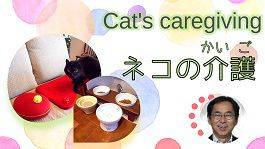
Pets in Japan
Japan is often seen as a crammed country with little space for people to live, let alone with pets.But pets are extremely popular here and pet owners and animal services are some of the most caring in the world.
There were an estimated 8.49 million dogs and 9.64 million cats being kept by owners in the country. And the pandemic has also seen a dramatic rise in pet ownership in Japan. A 2020 survey conducted by the Japan Pet Food Association found a 15% increase in dog and cat ownership compared with the previous year.
This blog by Japanese teacher Hiroshi Yamamoto tells of a personal story of pet caregiving. It is a moving slice of life tale that can help you practice your Japanese reading skills.
Yamamoto sensei also reads the blog in the YouTube video, so please watch that to practice listening to fluent Japanese.
ネコの介護
Giving care to our cat

By YAMAMOTO Hiroshi
我が家のネコはメスで、生まれて数ケ月ぐらいで我が家に来ました。名前は「メイ」と言います。娘が学校の帰り道で足を大けがしているネコを見つけて、連れて帰ったのです。まだ手の平にのるくらいだったと思います。急いで病院に連れて行って、手術をしてもらいました。その後、元気になりましたが、けがの後遺症はずっとあり、今でも歩くのが大変です。
若い頃は外で走り回り、よく他の野良ネコとけんかをして、顔をけがして帰ってきていました。12~13歳頃からは歳をとったので、外に出かけなくなりました。現在19歳になりましたが、食欲がなくなり、体重が減り、歩くのも遅くなりました。好きだった高い所にも登れず、一日ほとんどベッドの中で寝ています。でも鳴き声はまだ大きく、時々レッスン中にも鳴くことがあり、皆さんに迷惑をかけています。
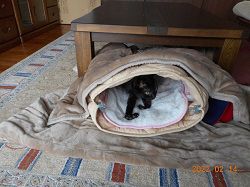
日本ペットフード協会の2020年の調査によると、ネコの平均寿命は15.5歳だそうです。
メイの19歳は人間で言うと92歳に相当するそうで、もうすっかり「お婆さん」です。そのため、この数年間は少しでも長生きしてもらおうと、家族全員でメイの介護をしています。
特に冬は寒いので注意が必要です。メイのいる部屋は一日中暖房をしています。ベットの中には湯たんぽを二つ入れています。袋のようなネコ専用のベッドもあり、冬は何時もその中にいます。
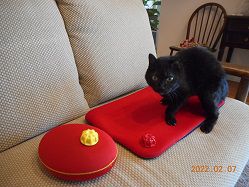
食事も大切で、かかりつけの獣医師によるとメイは腎臓が弱いとのことで、餌は食事療法食です。また、かむ力も弱くなっていますので、ペットフードを毎日細かく砕いたり、ベースト状にして栄養剤を加えたりしています。冬は飲む水は「お湯」にしてあげています。
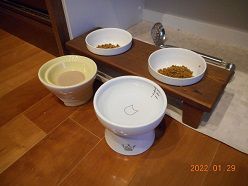
運動能力も落ちていますので、餌や水を入れている容器は、少し高さのある物に換えました。これは、首を曲げなくても食べられるようにするためです。トイレも出入り口の仕切りをまたぐのが大変そうだったので、踏み板を付けました。
体重も毎日計測していますが、あまり食べませんので痩せています。食欲が無かったり、元気が無い時には動物病院に連れて行って点滴をしてもらいます。
本当に家族のようで、体の弱いお婆さんを皆で介護している感じです。でも、家族で毎日メイの様子などを話しますので、共通の話題があることはいいことだと思います。 元気に春を迎えて、お気に入りの窓のそばで「ひなたぼっこ」が、またできると良いなと思っています。
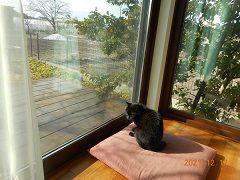
To listen to this blog, please watch our Youtube video.
ネコの介護(かいご)
我(わ)が家(や)のネコはメスで、生(う)まれて数ケ月(すうかげつ)ぐらいで我が家に来(き)ました。名前(なまえ)は「メイ」と言(い)います。娘(むすめ)が学校(がっこう)の帰(かえ)り道(みち)で足(あし)を大(おお)けがしているネコを見(み)つけて、連(つ)れて帰(かえ)ったのです。まだ手(て)の平(ひら)にのるくらいだったと思(おも)います。急(いそ)いで動物病院(どうぶつびょういん)に連れて行って、手術(しゅじゅつ)をしてもらいました。その後(ご)、元気(げんき)になりましたが、けがの後遺症(こういしょう)はずっとあり、今(いま)でも歩(ある)くのが大変(たいへん)です。
若(わか)い頃(ころ)は外(そと)で走(はし)り回(まわ)り、よく他(ほか)の野良(のら)ネコとけんかをして、顔(かお)をけがして帰ってきていました。12~13歳(さい)頃からは歳(とし)をとったので、外(そと)に出(で)かけなくなりました。現在(げんざい)19歳になりましたが、食欲(しょくよく)がなくなり、体重(たいじゅう)が減(へ)り、歩くのも遅(おそ)くなりました。好(す)きだった高(たか)い所(ところ)にも登(のぼ)れず、一日(いちにち)ほとんどベッドの中(なか)で寝(ね)ています。でも鳴(な)き声(ごえ)はまだ大(おお)きく、時々(ときどき)レッスン中(ちゅう)にも鳴(な)くことがあり、皆(みな)さんに迷惑(めいわく)をかけています。
日本(にほん)ペットフード協会(きょうかい)の2020年(ねん)の調査(ちょうさ)によると、ネコの平均寿命(へいきんじゅみょう)は15.5歳(さい)だそうです。メイの19歳は人間(にんげん)で言(い)うと92歳に相当(そうとう)するそうで、もうすっかり「お婆(ばあ)さん」です。そのため、この数年間(すうねんかん)は少(すこ)しでも長生(ながい)きしてもらおうと、家族全員(かぞくぜんいん)でメイの介護(かいご)をしています。
特(とく)に冬(ふゆ)は寒(さむ)いので注意(ちゅうい)が必要(ひつよう)です。メイのいる部屋(へや)は一日中(いちにちじゅう)暖房(だんぼう)をしています。ベットの中(なか)には湯(ゆ)たんぽを二(ふた)つ入(い)れています。袋(ふくろ)のようなネコ専用(せんよう)のベッドもあり、冬は何時(いつ)もその中(なか)にいます。
食事(しょくじ)も大切(たいせつ)で、かかりつけの獣医師(じゅういし)によるとメイは腎臓(じんぞう)が弱(よわ)いとのことで、餌(えさ)は食事療法食(しょくじりょうほうしょく)です。また、かむ力(ちから)も弱(よわ)くなっていますので、ペットフードを毎日(まいにち)細(こま)かく砕(くだ)いたり、ベースト状(じょう)にして栄養剤(えいようざい)を加(くわ)えたりしています。冬は飲(の)む水(みず)は「お湯(ゆ)」にしてあげています。
運動能力(うんどうのうりょく)も落(お)ちていますので、餌や水(みず)を入(い)れている容器(ようき)は、少(すこ)し高(たか)さのある物(もの)に換(か)えました。これは、首(くび)を曲(ま)げなくても食(た)べられるようにするためです。トイレも出入(でいり)り口(ぐち)の仕切(しき)りをまたぐのが大変(たいへん)そうだったので、踏(ふ)み板(いた)を付(つ)けました。
体重(たいじゅう)も毎日(まいにち)計測(けいそく)していますが、あまり食(た)べませんので痩(や)せています。食欲(しょくよく)が無(な)かったり、元気(げんき)が無い時(とき)には動物病院(どうぶつびょういん)に連(つ)れて行って点滴(てんてき)をしてもらいます。
本当(ほんとう)に家族(かぞく)のようで、体(かただ)の弱(よわ)いお婆(ばあ)さんを皆(みんな)で介護(かいご)している感(かん)じです。でも、家族(かぞく)で毎日(まにち)メイの様子(ようす)などを話(はな)しますので、共通(きょうつう)の話題(わだい)があることはいいことだと思(おも)います。
元気(げんき)に春(はる)を迎(むか)えて、お気(き)に入(い)りの窓(まど)のそばで「ひなたぼっこ」が、またできると良(い)いなと思っています。
Giving care to our cat
Our cat is female and came to us a few months after she was born. We named her "Mei". My daughter found her on her way home from school with a badly injured leg and brought her home. I think she was still small enough to fit in the palm of my hand. We rushed her to the hospital and they operated on her. She is fine now, but she still suffers from the after-effects of the injury and she still finds it difficult to walk.
When she was younger, she used to run around outside and fight with other stray cats and come home with an injured face. But now she became around 12-13 years old, she stopped going out because of her age. She is now 19 years old and has lost her appetite, her weight and her walking has become slower. She can't climb the high places she used to love and she sleeps in bed most of the day. But she is still very loud and sometimes even cries during lessons, which annoys everyone.
According to the Japan Pet Food Association's 2020 survey, the average life expectancy of a cat is 15.5 years. Mei's 19 years old is equivalent to 92 years old in human terms, which means she is already an old lady. So for the past few years our whole family has been taking care of Mei, trying to make her live as long as possible.
We have to be careful especially in winter because it is very cold. We keep her room heated all day long. We put two hot water bottles in her bed. She also has her own cat bed, which looks like a bag, and she stays in it all winter.
Her diet is also very important, and her vet says that she has weak kidneys, so she is on a therapeutic diet. She has also lost her ability to chew, so we grind her pet food into small pieces every day or make it into a paste and add nutritional supplements. In the winter, we give her "hot water" (or Oyu in Japanese) to drink.
Her mobility is also deteriorating, so we have changed her food and water containers to ones that are slightly higher. This is so that she can eat without having to bend her head. We have also added a stepping board to the toilet, as it was difficult for her to climb over the partition.
We weigh her every day, but she doesn't eat much, so she is thin. If she doesn't eat well or doesn't feel well, we take her to the vet and they give her a drip.
We really feel that she is a part of our family, we are all caring for a frail old grandmother. But we talk about how Mei is doing every day as a family, so I think it's good that we have something in common. Hopefully she will be well in the spring and we will be able to enjoy "sunbathing" beside her favourite window again.
介護(かいご): care
メス:female
連(つ)れて帰(かえ)る:take somebody home with one
手(て)のひら:palm
動物病院(どうぶつびょういん):veterinary clinic
手術(しゅじゅつ):operation
後遺症(こういしょう):after-effect
走(はし)り回(まわ)る:to run around
野良(のら):stray
食欲(しゅくよく):appetite
鳴(な)き声(ごえ):cry
迷惑(めいわく):trouble
ペットフード:pet food
協会(きょうかい):organization
調査(ちょうさ):survey
平均寿命(へいきんじゅみょう):life expectancy
相当(そうとう):being equivalent to
長生(ながい)き: long life
暖房(だんぼう): heating
湯(ゆ)たんぽ:hot-water bottle
専用(せんよう):use for a particular purpose
獣医師(じゅういし):veterinarian
食事療法(しょくじりょうほう):diet therapy
かむ:to chew
細(こま)かく: finely
砕(くだ)く: to smash
ペースト状(じょう):paste
栄養剤(えいようざい):nutrient
加(くわ)える:to add
能力(のうりょく):ability
容器(ようき):container
仕切(しき)り: division
またぐ:to step over
~そう:looking like
踏(ふ)み板(いた):footboard
計測(けいそく):measuring
痩(や)せる:to become thin
点滴(てんてき):intravenous drip
様子(ようす):appearance
共通(きょうつう):common
話題(わだい):topic
迎(むか)える:to approach
お気(き)に入(い)り:favorite
ひなたぼっこ:basking in the sun

Konnichiwa! My name is Hiroshi Yamamoto. I live in Oita in Kyushu with my family (my wife, daughter and an old female cat). Oita is famous for hot springs. I often visit hot springs in the winter.
My hobbies are gardening and watching soccer. When caring for my plants, I notice their daily changes and I feel relaxed. About soccer, I played soccer until about 20 years ago. But now I just watch the game.
I worked for a machine manufacturer for about 40 years. During that time, I worked in various departments including factory, trade, research and development, sales, general affairs, accounting, and auditing. I think I can help you to understand about business, industry and life in Japan from my experience.
What is your purpose of studying Japanese? Let’s make your dream come true by learning Japanese. I will do my best in our class to help you achieve your goals. Please knock on the classroom door at any time.


